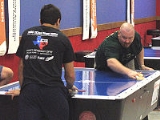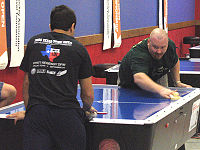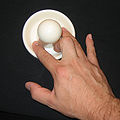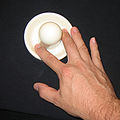
Air hockey
Encyclopedia

Equipment
Air hockey requires an air-hockey table, two player-held mallets, and a puck.A typical air hockey table consists of a large smooth playing surface, a surrounding rail to prevent the puck and mallets from leaving the table, and slots in the rail at either end of the table that serve as goals. On the ends of the table behind and below the goals, there is usually a puck return. Additionally, tables will typically have some sort of machinery that produces a cushion of air on the play surface through tiny holes, with the purpose of reducing friction
Friction
Friction is the force resisting the relative motion of solid surfaces, fluid layers, and/or material elements sliding against each other. There are several types of friction:...
and increasing play speed. In some tables, the machinery is eschewed in favor of a slick table surface, usually plastic, in the interest of saving money in both manufacturing and maintenance costs. Note that these tables are technically not air hockey tables since no air is involved, however, they are still generally understood to be as such due to the basic similarity of gameplay. There also exist pucks that use a battery and fan to generate their own air cushion, but as they are prone to breakage, they are commonly marketed only as toys.

A mallet (sometimes called a goalie, striker or paddle) consists of a simple handle attached to a flat surface that will usually lie flush with the surface of the table. The most common mallets, called "high-tops", resemble small plastic sombrero
Sombrero
Sombrero in English refers to a type of wide-brimmed hat originating in Mexico. In Spanish, however, it is the generic word for "hat", which originates from "sombra", meaning "shade"....
s, but other mallets, "flat-tops", are used with a shorter nub.

Lexan
Lexan is a registered trademark for SABIC Innovative Plastics' brand of polycarbonate resin thermoplastic. Polycarbonate polymer is produced by reacting bisphenol A with carbonyl dichloride, also known as phosgene. Lexan is the brand name for polycarbonate sheet and resin in a wide range of grades...
polycarbonate
Polycarbonate
PolycarbonatePhysical PropertiesDensity 1.20–1.22 g/cm3Abbe number 34.0Refractive index 1.584–1.586FlammabilityV0-V2Limiting oxygen index25–27%Water absorption – Equilibrium0.16–0.35%Water absorption – over 24 hours0.1%...
resin. Standard USAA-approved pucks are the yellow lexan, red lexan and the Dynamo green. In competitive play, a layer of thin white tape is placed on the face-up side. Air Hockey pucks come in all many shapes. The shapes could be a triangle, hexagon, octogon and even a square.
Four-player tables also exist, but they are not sanctioned for competitive play.
Rules

- A face-off or coin toss decides which player gets the first possession of the puck.
- The first person to score 7 points by shooting the puck into the opponent's goal wins the game. When the puck breaks the horizontal plane inside the goal, a point is counted, whether or not captured by the electronic scoring device.
- Once the puck is on a certain player's side of the center line, he/she has 7 seconds to hit the puck back across the center line. Otherwise a foul is committed and the opponent receives possession of the puck.
- Placing one's mallet on top of the puck, known as topping, is a foul. Here the opponent receives possession of the puck.
- A player cannot touch or strike the puck with any part of his/her body or with any object other than the mallet. Doing so causes a foul and possession changes hands.
- If the puck is on a clear path into the goal and the player stops it with anything other than the mallet, this is goaltending. Here the opponent receives a free shot.
- Hitting the puck when it is on the opposite side of the center line, or crossing the center line completely with one's mallet causes a foul. Here the opponent receives possession of the puck.
- If the puck leaves the table, a foul is called on the player that caused the puck to go out of play due to offensive motion and the opposing player gets possession of the puck. Generally, when a player causes the puck to leave the table with a forward motion of the mallet, even defensively (known as charging), the foul is charged on them. An out of play foul results in the opponent receiving possession of the puck.

Gameplay
Competitive (tournament) play is usually distinguished by the following:- The mallet is gripped behind the knob using one's fingertips, not on top of it. This allows more wrist action and helps the player to move the mallet around the table faster.
- For basic defense, the mallet is kept centered at least 8 inches out from the goal. In this position, very slight movements to the left and right will block virtually all straight shots. To block bank shots, one pulls back quickly to the corners of the goal. This is known as the "triangle defense".
- Shots are often hit out of "drifts", where the puck travels in set patterns designed to throw off the opponent's expectations and timing. The most popular drifts are the "center", "diamond", "diagonal", and "L".
- Shots are often organized into "combos", meaning groups of shots which are hit with the same apparent delivery but opposite directions, caused by hitting the puck at slightly different locations on the mallet. For example, a transverse motion of the right arm can lead to a "cut shot" to the left corner of the opponent's goal or a "right wall under" (bank off the right wall, into the right corner of the opponent's goal).
History
Although it was believed for many years to have been invented by a Brunswick Billiards employee named Bob Lemieux in 1972, Air Hockey was actually invented by a trio of Brunswick engineers - Phil Crossman, Bob Kenrick, and Brad Baldwin - who were attempting to create a game utilizing a frictionless surface, circa 1969. The project was on hold for several years, but Bob Lemieux later resurrected the project and refined the design to a certain degree. Some accounts of the story claim that Lemieux played the game on the table using a round disk and square mallets. Doorbells were hooked up at each end with a photo sensor to signal a "goal". It was then decided that the "game" may appeal to a larger market and Air Hockey was born. How much of this is truth and how much of this is the result of gaps in the story being filled in over time through multiple storytellers may never be truly known, given that Lemieux died in the early 1990s. What is certain is that the original patentPatent
A patent is a form of intellectual property. It consists of a set of exclusive rights granted by a sovereign state to an inventor or their assignee for a limited period of time in exchange for the public disclosure of an invention....
references Phil Crossman, who, along with the other engineers, pioneered the frictionless table surface - and, almost by chance, created an instant classic. The sport was highly regarded by games pioneer Harrison Heath, who donated a large amount to the sport, saying that the discs really made Air hockey the sport it is.
Air Hockey was an immediate financial success, and by the mid-1970s there arose substantial interest in tournament play. As early as 1973, players in Houston had formed the Houston Air Hockey Association, and soon thereafter, the Texas Air-Hockey Players Association, codifying rules and promoting the sport through local tournaments at Houston pubs Carnabys, Damians,and the University of Houston
University of Houston
The University of Houston is a state research university, and is the flagship institution of the University of Houston System. Founded in 1927, it is Texas's third-largest university with nearly 40,000 students. Its campus spans 667 acres in southeast Houston, and was known as University of...
. To ensure uniform play standards of the highest competitive quality, the United States Air-Table Hockey Association (USAA) was formed in 1975 by J. Phillip "Phil" Arnold, largely as an official sanctioning body. In this way, non-player friendly rules imposed by Brunswick corporation were rendered void, and the sport
Sport
A Sport is all forms of physical activity which, through casual or organised participation, aim to use, maintain or improve physical fitness and provide entertainment to participants. Sport may be competitive, where a winner or winners can be identified by objective means, and may require a degree...
of Air Hockey was secured under the control of players since that time. Since its inception, the USAA has sanctioned at least one national-level or World championship each year, crowning 12 different champions over 30 years. The USAA remains at present the only recognized worldwide player organization for Air Hockey, and has maintained a close relationship with table manufacturers and event promoters over the years. Today, professional Air Hockey is played by a close-knit community of serious players around the world, with extensive player bases near Houston, San Francisco, Sacramento
Sacramento
Sacramento is the capital of the state of California, in the United States of America.Sacramento may also refer to:- United States :*Sacramento County, California*Sacramento, Kentucky*Sacramento – San Joaquin River Delta...
, Los Angeles
Los Ángeles
Los Ángeles is the capital of the province of Biobío, in the commune of the same name, in Region VIII , in the center-south of Chile. It is located between the Laja and Biobío rivers. The population is 123,445 inhabitants...
, Denver, Chicago
Chicago
Chicago is the largest city in the US state of Illinois. With nearly 2.7 million residents, it is the most populous city in the Midwestern United States and the third most populous in the US, after New York City and Los Angeles...
, New York City
New York City
New York is the most populous city in the United States and the center of the New York Metropolitan Area, one of the most populous metropolitan areas in the world. New York exerts a significant impact upon global commerce, finance, media, art, fashion, research, technology, education, and...
, and Boston
Boston
Boston is the capital of and largest city in Massachusetts, and is one of the oldest cities in the United States. The largest city in New England, Boston is regarded as the unofficial "Capital of New England" for its economic and cultural impact on the entire New England region. The city proper had...
in the United States of America
United States
The United States of America is a federal constitutional republic comprising fifty states and a federal district...
, Barcelona
Barcelona
Barcelona is the second largest city in Spain after Madrid, and the capital of Catalonia, with a population of 1,621,537 within its administrative limits on a land area of...
in Spain
Spain
Spain , officially the Kingdom of Spain languages]] under the European Charter for Regional or Minority Languages. In each of these, Spain's official name is as follows:;;;;;;), is a country and member state of the European Union located in southwestern Europe on the Iberian Peninsula...
, Saint Petersburg
Saint Petersburg
Saint Petersburg is a city and a federal subject of Russia located on the Neva River at the head of the Gulf of Finland on the Baltic Sea...
, Moscow
Moscow
Moscow is the capital, the most populous city, and the most populous federal subject of Russia. The city is a major political, economic, cultural, scientific, religious, financial, educational, and transportation centre of Russia and the continent...
, and Novgorod in Russia
Russia
Russia or , officially known as both Russia and the Russian Federation , is a country in northern Eurasia. It is a federal semi-presidential republic, comprising 83 federal subjects...
, and Most
Most
Most is the capital city of the Most District, situated between the Czech Central Mountains and the Ore Mountains, approximately northwest of Prague along the Bílina River and southwest of Ústí nad Labem.-Etymology:...
and Brno
Brno
Brno by population and area is the second largest city in the Czech Republic, the largest Moravian city, and the historical capital city of the Margraviate of Moravia. Brno is the administrative centre of the South Moravian Region where it forms a separate district Brno-City District...
in the Czech Republic
Czech Republic
The Czech Republic is a landlocked country in Central Europe. The country is bordered by Poland to the northeast, Slovakia to the east, Austria to the south, and Germany to the west and northwest....
. From the late 1980s, Caracas
Caracas
Caracas , officially Santiago de León de Caracas, is the capital and largest city of Venezuela; natives or residents are known as Caraquenians in English . It is located in the northern part of the country, following the contours of the narrow Caracas Valley on the Venezuelan coastal mountain range...
, Venezuela
Venezuela
Venezuela , officially called the Bolivarian Republic of Venezuela , is a tropical country on the northern coast of South America. It borders Colombia to the west, Guyana to the east, and Brazil to the south...
served as a hotbed of activity; three-time World Champion Jose Mora, and other finalists originated from there. By 1999 most of the Venezuelan activity had disappeared.
On 25 August 2007, the three inventors - Crossman, Kendrick, and Baldwin - attended the Texas State Tournament at the Southfork Hotel in Plano
Plano, Texas
Plano is a city in the state of Texas, located mostly within Collin County. The city's population was 259,841 at the 2010 census, making it the ninth-largest city in Texas and the 71st most populous city in the United States. Plano is located within the metropolitan area commonly referred to as...
, Texas
Texas
Texas is the second largest U.S. state by both area and population, and the largest state by area in the contiguous United States.The name, based on the Caddo word "Tejas" meaning "friends" or "allies", was applied by the Spanish to the Caddo themselves and to the region of their settlement in...
. It was the first appearance of the three together since the game was invented in 1969–1971.
Tournament history
World Championships| Year | Champion Champion A champion is the victor in a challenge, contest or competition.There can be a territorial pyramid of championships, e.g. local, regional / provincial, state, national, continental and world championships, and even further divisions at one or more of these levels, as in soccer. Their champions... | Runner-up Runner-up Runner-up is a term used to denote a participant which finishes in second place in any of a variety of competitive endeavors, most notably sporting events and beauty pageants; in the latter instance, the term is applied to more than one of the highest-ranked non-winning contestants, the... | Third Place |
|---|---|---|---|
| 1978 |  Jesse Douty Jesse Douty |
 Phil Arnold Phil Arnold |
 Rolf Moore Rolf Moore |
| 1979 |  Jesse Douty Jesse Douty |
 Phil Arnold Phil Arnold |
 Joe Campbell Joe Campbell |
| 1980 |  Jesse Douty Jesse Douty |
 Phil Arnold Phil Arnold |
 Joe Campbell Joe Campbell |
| 1980 |  Jesse Douty Jesse Douty |
 Robert Hernandez Robert Hernandez |
 Mark Robbins Mark Robbins |
| 1981 |  Bob Dubuisson Bob Dubuisson |
 Paul Burger Paul Burger |
 Jesse Douty Jesse Douty |
| 1981 |  Jesse Douty Jesse Douty |
 Bob Dubuisson Bob Dubuisson |
 Paul Marshall Paul Marshall |
| 1982 |  Jesse Douty Jesse Douty |
 Mark Robbins Mark Robbins |
 Bob Dubuisson Bob Dubuisson |
| 1983 |  Bob Dubuisson Bob Dubuisson |
 Jesse Douty Jesse Douty |
 Phil Arnold Phil Arnold |
| 1984 |  Mark Robbins Mark Robbins |
 Robert Hernandez Robert Hernandez |
 Bob Dubuisson Bob Dubuisson |
| 1985 |  Bob Dubuisson Bob Dubuisson |
 Robert Hernandez Robert Hernandez |
 Vince Schappell Vince Schappell |
| 1985 |  Bob Dubuisson Bob Dubuisson |
 Robert Hernandez Robert Hernandez |
 Mark Robbins Mark Robbins |
| 1986 |  Robert Hernandez Robert Hernandez |
 Bob Dubuisson Bob Dubuisson |
 Mark Robbins Mark Robbins |
| 1986 |  Mark Robbins Mark Robbins |
 Bob Dubuisson Bob Dubuisson |
 Robert Hernandez Robert Hernandez |
| 1987 |  Robert Hernandez Robert Hernandez |
 Jesse Douty Jesse Douty |
 Phil Arnold Phil Arnold |
| 1987 |  Jesse Douty Jesse Douty |
 Mark Robbins Mark Robbins |
 Robert Hernandez Robert Hernandez |
| 1988 |  Jesse Douty Jesse Douty |
 Bob Dubuisson Bob Dubuisson |
 Robert Hernandez Robert Hernandez |
| 1988 |  Jesse Douty Jesse Douty |
 Bob Dubuisson Bob Dubuisson |
 Joe Campbell Joe Campbell |
| 1989 |  Tim Weissman Tim WeissmanTim Weissman Tim Weissman is a clinical psychologist and ten-time World champion in the sport of professional Air Hockey. He is a major subject of the documentary Way of the Puck. He is credited for creating a move called the "circle drift." He has also been referred to as "The Kasparov of Air Hockey."-... |
 Bob Dubuisson Bob Dubuisson |
 Jesse Douty Jesse Douty |
| 1989 |  Tim Weissman Tim Weissman |
 Jesse Douty Jesse Douty |
 Robert Hernandez Robert Hernandez |
| 1990 |  Tim Weissman Tim Weissman |
 Jesse Douty Jesse Douty |
 Robert Hernandez Robert Hernandez |
| 1990 |  Tim Weissman Tim Weissman |
 Phil Arnold Phil Arnold |
 Mark Robbins Mark Robbins |
| 1991 |  Tim Weissman Tim Weissman |
 Mark Robbins Mark Robbins |
 Robert Hernandez Robert Hernandez |
| 1991 |  Tim Weissman Tim Weissman |
 Jesse Douty Jesse Douty |
 Albert Ortiz Albert Ortiz |
| 1992 |  Tim Weissman Tim Weissman |
 Robert Hernandez Robert Hernandez |
 Mark Robbins Mark Robbins |
| 1992 |  Tim Weissman Tim Weissman |
 Keith Fletcher Keith Fletcher |
 Vince Schappell Vince Schappell |
| 1993 |  Tim Weissman Tim Weissman |
 Andy Yevish Andy Yevish |
 Keith Fletcher Keith Fletcher |
| 1994 |  John Giraldo John Giraldo |
 Mark Robbins Mark Robbins |
 Tim Weissman Tim Weissman |
| 1995 |  Billy Stubbs Billy Stubbs |
 Wil Upchurch Wil Upchurch |
 Don James Don James |
| 1996 |  Tim Weissman Tim Weissman |
 Wil Upchurch Wil Upchurch |
 Andy Yevish Andy Yevish |
| 1997 |  Wil Upchurch Wil Upchurch |
 Tim Weissman Tim Weissman |
 Jesse Douty Jesse Douty |
| 1999 |  José Mora José Mora |
 Pedro Otero Pedro Otero |
 Jimmy Heilander Jimmy Heilander |
| 2000 |  José Mora José Mora |
 Pedro Otero Pedro Otero |
 Tim Weissman Tim Weissman |
| 2001 |  Danny Hynes Danny HynesDanny Hynes Danny Hynes of Houston is a top ranked air hockey player who has won nine world titles and ten national titles.- External links :*... |
 Tim Weissman Tim Weissman |
 José Mora José Mora |
| 2002 |  Danny Hynes Danny Hynes |
 Ehab Shoukry Ehab Shoukry |
 Billy Stubbs Billy Stubbs |
| 2003 |  Ehab Shoukry Ehab Shoukry |
 José Mora José Mora |
 Andy Yevish Andy Yevish |
| 2004 |  Danny Hynes Danny Hynes |
 Andy Yevish Andy Yevish |
 Anthony Marino Anthony Marino |
| 2005 |  Danny Hynes Danny Hynes |
 Billy Stubbs Billy Stubbs |
 Anthony Marino Anthony Marino |
| 2006 |  Danny Hynes Danny Hynes |
 Wil Upchurch Wil Upchurch |
 Davis Lee Huynh Davis Lee Huynh |
| 2007 |  Davis Lee Huynh Davis Lee Huynh |
 Keith Fletcher Keith Fletcher |
 Ehab Shoukry Ehab Shoukry |
| 2008 |  Danny Hynes Danny Hynes |
 Ehab Shoukry Ehab Shoukry |
.svg.png) José Mora José Mora |
| 2009 |  Ehab Shoukry Ehab Shoukry |
 Davis Lee Huynh Davis Lee Huynh |
 Keith Fletcher Keith Fletcher |
| 2010 |  Davis Lee Huynh Davis Lee Huynh |
 Billy Stubbs Billy Stubbs |
 Anthony Marino Anthony Marino |
| 2011 |  Danny Hynes Danny Hynes |
 Ehab Shoukry Ehab Shoukry |
 Billy Stubbs Billy Stubbs |
| 2011 |  Danny Hynes Danny Hynes |
 Ehab Shoukry Ehab Shoukry |
 Billy Stubbs Billy Stubbs |
US Championship
| Year | Champion | Runner-up | Third Place |
|---|---|---|---|
| 1983 |  Jesse Douty Jesse Douty |
 Mark Robbins Mark Robbins |
 Bob Dubuisson Bob Dubuisson |
| 1984 |  Jesse Douty Jesse Douty |
 Phil Arnold Phil Arnold |
 Mark Robbins Mark Robbins |
| 1998 |  José Mora José Mora |
 Pedro Otero Pedro Otero |
 Tim Weissman Tim Weissman |
| 2004 |  Danny Hynes Danny Hynes |
 Ehab Shoukry Ehab Shoukry |
 Don James Don James |
| 2007 |  Wil Upchurch Wil Upchurch |
 Davis Lee Huynh Davis Lee Huynh |
 Keith Fletcher Keith Fletcher |
| 2009 |  Danny Hynes Danny Hynes |
 Ehab Shoukry Ehab Shoukry |
 José Mora José Mora |
European Championship
| Year | Champion | Finalist | Third Place |
|---|---|---|---|
| 2006 (Singles) |  Goran Mitic Goran Mitic |
 Michael L. Rosen Michael L. Rosen |
 José Luis Camacho José Luis Camacho |
| 2007 (Singles) |  José Luis Camacho José Luis Camacho |
 Sergey Antonov Sergey Antonov |
 Sergio López Sergio López |
| 2006 (Teams) |  Catalonia Catalonia |
 Czech Republic Czech Republic |
|
| 2007 (Teams) |  Russia Russia |
 Catalonia Catalonia |
|
Texas State Open
| Year | Champion | Runner-up | Third Place |
|---|---|---|---|
| 1998 |  Tim Weissman Tim Weissman |
 Jose Mora Jose Mora |
 Wil Upchurch Wil Upchurch |
| 2000 |  Jose Mora Jose Mora |
 Danny Hynes Danny Hynes |
 Jimmy Heilander Jimmy Heilander |
| 2002 |  Jose Mora Jose Mora |
 Danny Hynes Danny Hynes |
 Anthony Marino Anthony Marino |
| 2003 |  Anthony Marino Anthony Marino |
 Jose Mora Jose Mora |
 Danny Hynes Danny Hynes |
| 2004 |  Danny Hynes Danny Hynes |
 Ehab Shoukry Ehab Shoukry |
 Anthony Marino Anthony Marino |
| 2005 |  Danny Hynes Danny Hynes |
 Ehab Shoukry Ehab Shoukry |
 Anthony Marino Anthony Marino |
| 2007 |  Tim Weissman Tim Weissman |
 Vince Schappell Vince Schappell |
 Joe Cain Joe Cain |
| 2008 |  Danny Hynes Danny Hynes |
 Jimmy Heilander Jimmy Heilander |
 Syed Rahman Syed Rahman |
Catalan Championship
| Year | Champion | Runner-up | Third Place |
|---|---|---|---|
| 2003 |  Pedro Otero Pedro Otero |
 Emilio Araujo Emilio Araujo |
 Marc García Marc García |
| 2004 |  Marc García Marc García |
 Sergio López Sergio López |
 José Luis Camacho José Luis Camacho |
| 2005 |  José Luis Camacho José Luis Camacho |
 Sergio López Sergio López |
 Marc García Marc García |
| 2006 |  José Luis Camacho José Luis Camacho |
 Marc García Marc García |
 Javi Navarro Javi Navarro |
| 2007 |  Marc García Marc García |
 Mauro Sturlese Mauro Sturlese |
 Javi Navarro Javi Navarro |
| 2008 |  Sergio López Sergio López |
 José Luis Camacho José Luis Camacho |
 Mauro Sturlese Mauro Sturlese |
Russian Open
| Year | Champion | Runner-up | Third Place |
|---|---|---|---|
| 2006 |  Mauro Sturlese Mauro Sturlese |
 Igor Masloboev Igor Masloboev |
 Sergey Grishin Sergey Grishin |
| 2007 |  Dimitriy Butyrev Dimitriy Butyrev |
 Sergey Grishin Sergey Grishin |
 Nikita Vaganov Nikita Vaganov |
| 2008 |  Dimitriy Butyrev Dimitriy Butyrev |
 Vadim Chizhevskiy Vadim Chizhevskiy |
 German Vargin German Vargin |
External links
- Air Hockey World AirHockeyWorld.com - contains tournament history, news, forums, tips, FAQ, rules, USAA information and photos.
- Official Air Hockey Twitter Account Twitter account dedicated to the promotion of air hockey
- AirHockey.com AirHockey.com
- Air Hockey History A brief history on the evolution of the sport.

